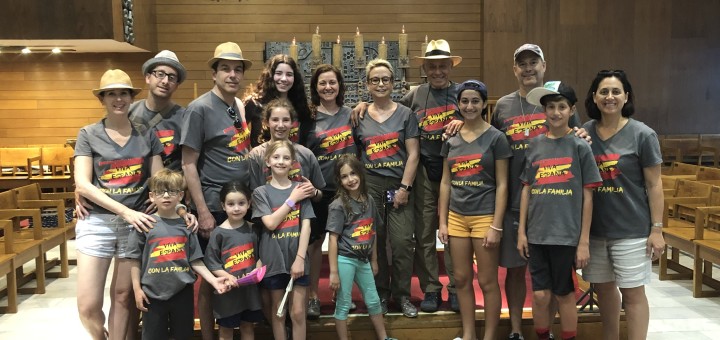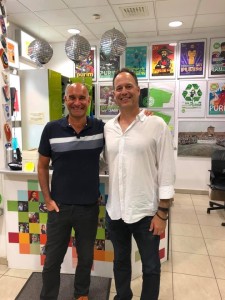For our family vacation this summer, we chose to go back to discover our roots. We started in Poland, where the Ashkenazi side of the family could learn more about our past, and ended in Spain to explore our Sephardic heritage.
In each country, we captured images of castles and meandered through museums. We got lost wandering down ancient cobblestone streets and were guided through Jewish Quarters. We stood in countless churches, many of which used to be synagogues, and at least one synagogue that had been turned into a cafe. We flew on planes, rode trains, and drove through countrysides. We biked through Madrid, took a boat ride down the Canal de Alfonso XIII and even rode Segways in Sevilla.
It was a full trip of learning and exploring, but one of the most meaningful experiences was celebrating Shabbat in two locations with deep scars for the Jews: Krakow, Poland and Sevilla, Spain.
Poland was the epicenter of the worst crime committed against the Jews in the 20th century, the Shoah; while Spain was the perpetrator of the Inquisition, which forced conversion, death and expulsion of Spanish Jews for nearly 400 years. It is still hard to believe 1834 was the year the Inquisition officially ended. (By the way, the first pogroms committed against Jews in Spain occurred in Sevilla in 1391, nearly 100 years before the official start of the Inquisition.)
We enjoyed our first Shabbat at the JCC Krakow shoulder to shoulder with nearly 100 Jews from all over the world. The JCC Krakow has become the beating heart for a rebirth of Jewish life in Poland. Led by its visionary Executive Director, Jonathan Ornstein, and the help of funding by philanthropists like Tad Taube—profiled recently in J. The Jewish News of Northern California—the JCC Krakow hosts a Jewish preschool, a thriving Jewish arts program, the annual Ride for the Living bike ride from Auschwitz and weekly Shabbat dinners for hundreds of locals and visitors. The JCC Krakow is also a co-presenter of daily events for the world-famous Jewish Culture Festival in Krakow, which we had the good fortunate to attend as it was taking place during our visit.
On this particular evening, we sat at the Shabbat dinner tables crammed in alongside over 100 people, including eight Shoah survivors, families from all over the globe, kids from Camp Ramah, and a handful of regulars in their 20s and 30s who are part of the Ravi fan club. Ravi is the nickname given to Rabbi Avi Baumol, the spiritual leader of the local community who has started to build a following of millennials embracing their Jewish roots.
It was a beautiful evening. Ravi led us in the blessings; Jonathan offered some welcoming remarks; we sang songs; we ate and schmoozed; we heard a D’var Torah from a Polish woman in her 80s; we did the post-meal blessing; and then it was time for a once-a-year evening activity.
Because we were in Krakow as the Jewish Culture Festival was beginning, we had the opportunity to take part in a special pre-festival opening tradition. The synagogue filled up with anxious fans of over a dozen rabbis and cantors who were visiting Krakow from around the world. Sure enough, each leader approached the bimah, one by one, to perform for the crowd. They picked a favorite song, prayer or ‘negune’ (melody) and they began to sing into the microphone. They are the rock stars of their world, but because this impromptu congregation was made up of more non-Jews than Jews, the big sanctuary didn’t reverberate with more than a handful of voices joining in.
But halfway through each performance, a 94-year old Shoah survivor from the community jumped up and started to dance. I was struck by the realization that if this man, who has endured the worst evils in the world, is able to smile and dance, then surely anyone can. And I have to believe it’s witnessing the resurrection of Jewish life here in Poland that has given him back his smile.
We celebrated our second Shabbat in Sevilla, Spain. There is no JCC here and not even a hint of the rich Jewish life that once existed. There is a single Jewish tombstone representing the hundreds of years of vibrant Jewish life that was once here – but it’s displayed behind a glass wall deep in the bowels of a parking garage, which stands where the Jewish cemetery once did.
For this Shabbat, we chose to gather our family in the restaurant of the hotel where we stayed. In the beautiful open atrium, amidst other hotel guests, we came dressed in our Shabbat whites, donned our kipot, lit the candles, sang the blessings, and shared some wine and bread. The whole service didn’t last more than ten minutes, but the fact that we were celebrating publicly in this place was a powerful statement because in this place, Jews were for forced to disavow their Jewishness or live in the shadows for centuries. This is the place where crypto-Jews (known derogatorily as Moranos) practiced their Jewish rituals in secret for fear of death, and Conversos transformed their ancient Jewish rituals into masked Christian rituals, where being Jewish was a crime for 400 years!
One such ritual was the lighting of two candles every Friday night – to honor the Virgin Mary. Only centuries later and after much research, have these Conversos learned that this ritual, which has been passed down from grandmother to mother to daughter, is really the Jewish tradition of lighting Shabbat candles.
There was no Shoah survivor in Spain to celebrate with us. There is no Sephardic philanthropist funding the resurrection of Jewish life in Sepharad. And there is no annual Jewish culture festival celebrating hundreds of years of Jewish life there. However, I still had an important realization in Spain: As bad as things seem in the world today – fascist leaders, desperate refugees, emboldened terrorists, detained immigrants, etc. – we need to pause for a moment to appreciate how much better it is too. There is more clean water for more of the planet; more access to better education around the world; more acceptance of LGBTQ rights than ever before; and of course, more religious freedom – especially for Jews.
The fact that we can celebrate Shabbat with pride, in public, outside of the shadows in places like Poland and Spain, is a moment to embrace. This is a moment to be grateful for. This is a moment that will hopefully last forever. But today, I will honor it by saying the Shehechiyanu – a blessing of thanks for allowing me to live to see this moment.








Shabbat Kiddush. At the end of a long week, we gather around the table to recite Kiddush with family and friends, and declare Shabbat a holy day over a cup of wine .